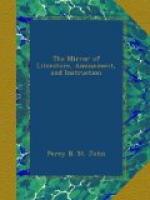Even in Iceland, there is a provision for the poor.—Vide Han’s “Iceland.” Also in Denmark.—Vide p. 292, Jacob’s “Tracts on the Corn Laws.” In America there are poor laws.—Vide Dr. Dwight’s “Travels,” vol. iv. p. 326. In Scotland the English system is rapidly extending; and where the poor laws are not introduced, there are a great many of the miseries which are found in Ireland.—Vide “Evidence of A. Nimmo, Esq. before the Lords’ Committee on Ireland, 1824.” This gentleman thinks, that if they had been earlier introduced, Scotland would be now a richer country. He also states, that the average expense of supporting idle mendicants in Ireland, exceeds one million and a half annually, by the contribution of more than a ton of potatoes from each farm house, to encourage a system of licentious idleness, profligacy, insolence, and plunder; and the grand jury presentments amount annually to a million.—Monthly Mag.
* * * * *
In Turkey, nailing by the ears is an operation performed on bakers, for selling light bread. There is a hole cut in the door for the back of the culprit’s head; the ears are then nailed to the panel; he is left in this position till sunset, then released; and seldom sustains any permanent injury from the punishment, except in his reputation. Perjury is an offence which is so little thought of, that it is visited with the mildest of all their punishments. The offender is set upon an ass, with his face to the tail, and a label on his back, with the term scheat or perjurer. In this way he is led about to the great amusement of the multitude, and even of his associates.
* * * * *
SCHOOL DAYS.
Linnaeus long retained an unpleasant recollection of his school days;[5] it is common to call this period of human life, a happy one, but that existence must have been very wretched, of which, the time passed at school has been the happiest part; it is sufficiently apparent even to superficial observers that the mind cannot, in early life, be sufficiently matured for high enjoyment; the most exquisite of our pleasures, are intellectual, and cannot be relished until the mental faculties have been cultivated and expanded.—Clayton’s Sketches in Biography.
[5] He was sent at the age
of ten years to a school at Wexin,
the
master of which was so severe as entirely to destroy
his
spirits,
and repress the early indications of his extraordinary
talents.
* * * * *
* * * * *
AUTOBIOGRAPHY OF A LANDAULET!
I dined one day at a bachelor’s dinner in Lincoln’s Inn-fields, and my wife having no engagement that evening, I gave my coachman a half holiday, and when he had set me down, desired him to put up his horses, as I should return home in a jarvey. At eleven, my conveyance arrived; the steps were let down, and, when down, they slanted under the body of the carriage; my foot slipped from the lowest step, and I grazed my shin against the second; but at last I surmounted the difficulty, and seating myself, sank back upon the musty, fusty, ill-savoured squabs of the jarvey.




